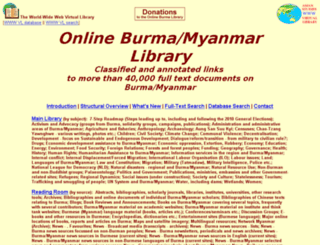Focal point
Location
The Online Burma/Myanmar Library (OBL) is a non-profit online research library mainly in English and Burmese serving academics, activists, diplomats, NGOs, CSOs, CBOs and other Burmese and international actors. It is also, of course, open to the general public. Though we provide lists of Burma/Myanmar news sources, the Library’s main content is not news but in-depth articles, reports, laws, videos and links to other websites, We provide a search engine (database and full text) and an alphabetical list of categories and sub-categories, but the Library is best accessed through browsing the 100 or so categories which lead to sub- and sub-sub categories. These tools should be used in combination.
Members:
Resources
Displaying 791 - 795 of 1151Broken Trust, Broken Home
Fifty-five years of civil war have decimated Burma’s Karen State, forcing thousands of civilians to flee their homes. Most would like to return—by their own will when the fighting stops.
By Emma Larkin/Mae Sot, Thailand
Agricultural Marketing Reform and Rural Economy in Myanmar
The purpose of this paper is to examine the impact of marketing reforms implemented in the late 1980s in Myanmar. Particular emphasis is placed on the impact of the reform on the rural economy and its participants, namely farmers, landless laborers and marketing intermediaries. The reform had a positive effect on all these participants through the creation of employment opportunities and increased income.
Back Pack Health Worker Team (BPHWT) home page
Mission Statement: "The Back Pack Health Worker Team (BPHWT) is an independent, nonprofit, multi-ethnic organization dedicated to providing primary health care to ethnic groups and vulnerable populations in armed conflict and rural areas of Burma, where access to healthcare is otherwise unavailable. Furthermore, by equipping communities with the skills and knowledge necessary to manage their own health issues, the Back Pack Health Worker Team is dedicated to the long-term, sustainable development of a healthy society in Burma.
RUNNING THE GAUNTLET: THE IMPACT OF INTERNAL DISPLACEMENT IN SOUTHERN SHAN STATE
The plight of Burma's internally displaced persons has largely been overlooked by the
international community and the Burmese government itself. Villagers in the country's war
zones nevertheless have suffered for decades the adverse effects of conflict. For some,
displacement has become a way of life and a multi-generational phenomenon.
Displacement wherever it occurs profoundly changes the persons forced to move. People
lose belongings, jobs, and loved ones. The case of the internally displaced in southern Shan
State is no different.
Fertility and abortion: Burmese women's health on the Thai-Burma border
In Thailand's Tak province there
are 60,520 registered migrant
workers and an estimated 150,000
unregistered migrant workers from
Burma. Fleeing the social and political
problems engulfing Burma, they are
mostly employed in farming, garment
making, domestic service, sex and
construction industries. There is also
a significant number of Burmese
living in camps. Despite Thailandâ�â¢s
developed public health system and
infrastructure, Burmese women face
language and cultural barriers and


